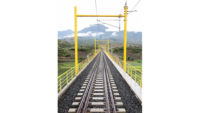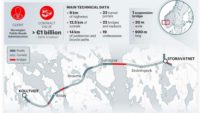Ten bidders, including five Chinese companies and joint ventures, have been prequalified for a $2.2 billion bridge construction project in Nigeria’s Lagos state. The 38km-long bridge will be the fourth to connect Lagos island to the mainland.
A statement by the Lagos state government says prequalified bidders are among 32 teams that had expressed interest in development of the post-tensioned balanced cantilever segmental box girder structure under a build, operate and transfer contract.
Those prequalified include China Civil Engineering Construction Corp. Nigeria, a joint venture between China Gezhouba Group and the China Geo-Engineering Corporation; China Harbour Engineering; China State Construction Engineering Corp. Nigeria; Power Construction Corp. of China Communications Construction; China Communications Construction; Mota-Engil of Portugal; IC Ictas of Turkey; Ingenieros Consultores of Spain; Julius Berger of Germany; and Mutual Commitment Co. of Nigeria.
Officials have not confirmed when construction on the proposed bridge project, which was initially announced in 2006 and is to be financed under a public-private partnership, will begin. Work had been set to start in 2017 and be completed in 2019 but was delayed because of unresolved issues related to properties and settlements along the project route.
The bridge “will reduce Lagos congestion and relieve strain on the existing 3rd Mainland bridge by providing an alternative route,” said Rendel Ltd. in a project brief. Rendel previously signed a collaborative agreement with Nigeria to design the bridge.
Other smaller bridges linking Lagos island to Lagos State mainland include the 1.35km long Eko bridge built by Julius Berger Nigeria Plc and the 1901 Carter bridge.
The 4th Mainland bridge is located on the tolled 49km-long Lekk-Epe expressway with a speed limit of 120 km per hour. The expressway has annual average daily traffic of 397,000, with the new bridge expected to carry up to 75% of the traffic.
When completed, the 4th mainland bridge will be part of larger transportation master plans that Nigeria is anticipating to boost the contribution of the country’s infrastructure to at least 70% of national economic growth from the current 25%.



Post a comment to this article
Report Abusive Comment